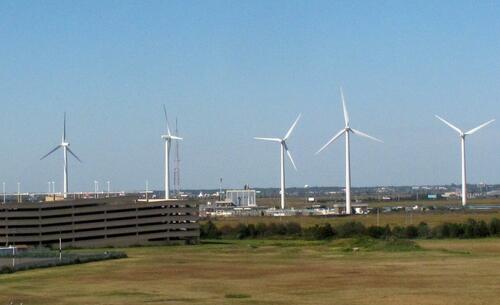
Authored by Pete Stauber via RealClear Energy (emphasis ours),
Everything in this world is either grown or mined, and if we don’t grow it or mine it in America, we import it. Events from the past few years, namely the COVID-19 pandemic and the Russian invasion of Ukraine, have highlighted America’s hunger for metals, including copper, nickel, cobalt, platinum-group elements, and more. Therefore, Congress needs to boost domestic production. Instead, the majority is putting up more arbitrary hurdles, like the so-called Clean Energy Minerals Reform Act.

Don’t let the name fool you. This legislation, introduced by Chairman Grijalva (D-AZ) and being considered before the House Natural Resources Subcommittee on Energy and Mineral Resources this week, will make it even harder to access clean energy minerals domestically while furthering our reliance on Russia, China, and the Congo. The bill contains several provisions that contribute to longtime goals of the Left: dissuade investment in mining and choke projects to death with an unpredictable permitting process.
Talk to any miner, member of the building trades, or industry expert and you’ll hear the same frustration about mining in America: permitting timelines are too long, too uncertain, and incentivize lawsuits and trial lawyers. Take, for example, the PolyMet project in my northern Minnesota District which is approaching two decades of permitting and litigation. PolyMet proposes to mine copper, nickel, cobalt, and more. It has won every lawsuit thrown its way but is still being targeted by the Biden Administration. We cannot wait 20 years to get the nickel we need; not while state-owned Russian companies are dominating the market.
So, how does the Grijalva bill address our permitting timelines? By adding two more duplicative permit requirements. Adding these permits wouldn’t add just months or years, they could add decades to review. Every permit approval will be met with a lawsuit brought on by an activist group and met with a wink and a nod from a faceless bureaucrat in the Administration, dragging it out further and further. So, instead of PolyMet taking a mere 20 years, it’s a good possibility it could be 40 or 50 years under this Leftist dream.
The Grijalva bill also puts hardrock mining squarely in the crosshairs by upending the claims system. Hardrock mineral rights are established through mining claims. Companies then drill thousands of exploratory holes to determine if the resource is even economical to develop. Only about 1 in every 1,000 discoveries results in a mine. For example, the Twin Metals project in my district has already invested just shy of $1 billion in a new mine, before even starting the permitting process. The bill considered this week would make it an oil and gas-style leasing system, treating copper like you would natural gas, making it even less economical for companies to invest in American resources.
And finally, the bill imposes punitive royalties on hardrock mines in America. Every new mine that survives litigation would be subject to a 12.5% royalty. Meanwhile, existing mines aren’t immune either: a functioning mine would owe 8% of everything they extract to the federal government. Hardrock resources cover a wide variety of minerals, occur in unique geologic formations, and all have varying commodity prices. The one-size-fits-all royalty scheme proposed by Chairman Grijalva and President Biden in his Interagency Working Group Recommendations, like upending the claims system, is another bold attempt to shutter investment.
It makes no sense to subject such a wide variety of minerals to the same, inelastic royalty. For example, lithium in Nevada is derived from a salt brine, while copper and nickel in northern Minnesota will be pulled out of the ground as a solid ore. Meanwhile, mining in Minnesota funds every single school district in the state. If we slap the Grijalva Tax on mines in America, it’ll push companies looking to invest in Minnesota overseas.
America is facing a metals crisis. We can no longer rely on our foreign adversaries to supply us with the copper, nickel, cobalt, and other minerals we need for modern life. Instead of making it harder to mine American resources, as the Grijalva legislation does, there are steps Congress can take to make America an attractive place for mining.
First, we need to update the permitting process. It should not take 20 years to develop our natural resources. Reviews should be timely, transparent, and reasonable. We also need to limit the President’s authority to arbitrarily kill projects with the stroke of a pen. Just this past February, Biden chose to cancel the federal leases held by the Twin Metals project that date back to the 1960’s. Legislation I introduced, the Accessing America’s Critical Minerals Act and the Saving America’s Mines Act, would update our permitting process and end the President’s authority to kill mining with the stroke of a pen.
This week, as Congress considers the so-called Clean Energy Minerals Reform Act, don’t buy the rhetoric. Democrats proposed this legislation to make permitting more difficult and dissuade investment, making our supply chains even more crippled. Let’s instead consider serious proposals that grow mining in America and secure our domestic supply chains.
Authored by Pete Stauber via RealClear Energy (emphasis ours),
Everything in this world is either grown or mined, and if we don’t grow it or mine it in America, we import it. Events from the past few years, namely the COVID-19 pandemic and the Russian invasion of Ukraine, have highlighted America’s hunger for metals, including copper, nickel, cobalt, platinum-group elements, and more. Therefore, Congress needs to boost domestic production. Instead, the majority is putting up more arbitrary hurdles, like the so-called Clean Energy Minerals Reform Act.

Don’t let the name fool you. This legislation, introduced by Chairman Grijalva (D-AZ) and being considered before the House Natural Resources Subcommittee on Energy and Mineral Resources this week, will make it even harder to access clean energy minerals domestically while furthering our reliance on Russia, China, and the Congo. The bill contains several provisions that contribute to longtime goals of the Left: dissuade investment in mining and choke projects to death with an unpredictable permitting process.
Talk to any miner, member of the building trades, or industry expert and you’ll hear the same frustration about mining in America: permitting timelines are too long, too uncertain, and incentivize lawsuits and trial lawyers. Take, for example, the PolyMet project in my northern Minnesota District which is approaching two decades of permitting and litigation. PolyMet proposes to mine copper, nickel, cobalt, and more. It has won every lawsuit thrown its way but is still being targeted by the Biden Administration. We cannot wait 20 years to get the nickel we need; not while state-owned Russian companies are dominating the market.
So, how does the Grijalva bill address our permitting timelines? By adding two more duplicative permit requirements. Adding these permits wouldn’t add just months or years, they could add decades to review. Every permit approval will be met with a lawsuit brought on by an activist group and met with a wink and a nod from a faceless bureaucrat in the Administration, dragging it out further and further. So, instead of PolyMet taking a mere 20 years, it’s a good possibility it could be 40 or 50 years under this Leftist dream.
The Grijalva bill also puts hardrock mining squarely in the crosshairs by upending the claims system. Hardrock mineral rights are established through mining claims. Companies then drill thousands of exploratory holes to determine if the resource is even economical to develop. Only about 1 in every 1,000 discoveries results in a mine. For example, the Twin Metals project in my district has already invested just shy of $1 billion in a new mine, before even starting the permitting process. The bill considered this week would make it an oil and gas-style leasing system, treating copper like you would natural gas, making it even less economical for companies to invest in American resources.
And finally, the bill imposes punitive royalties on hardrock mines in America. Every new mine that survives litigation would be subject to a 12.5% royalty. Meanwhile, existing mines aren’t immune either: a functioning mine would owe 8% of everything they extract to the federal government. Hardrock resources cover a wide variety of minerals, occur in unique geologic formations, and all have varying commodity prices. The one-size-fits-all royalty scheme proposed by Chairman Grijalva and President Biden in his Interagency Working Group Recommendations, like upending the claims system, is another bold attempt to shutter investment.
It makes no sense to subject such a wide variety of minerals to the same, inelastic royalty. For example, lithium in Nevada is derived from a salt brine, while copper and nickel in northern Minnesota will be pulled out of the ground as a solid ore. Meanwhile, mining in Minnesota funds every single school district in the state. If we slap the Grijalva Tax on mines in America, it’ll push companies looking to invest in Minnesota overseas.
America is facing a metals crisis. We can no longer rely on our foreign adversaries to supply us with the copper, nickel, cobalt, and other minerals we need for modern life. Instead of making it harder to mine American resources, as the Grijalva legislation does, there are steps Congress can take to make America an attractive place for mining.
First, we need to update the permitting process. It should not take 20 years to develop our natural resources. Reviews should be timely, transparent, and reasonable. We also need to limit the President’s authority to arbitrarily kill projects with the stroke of a pen. Just this past February, Biden chose to cancel the federal leases held by the Twin Metals project that date back to the 1960’s. Legislation I introduced, the Accessing America’s Critical Minerals Act and the Saving America’s Mines Act, would update our permitting process and end the President’s authority to kill mining with the stroke of a pen.
This week, as Congress considers the so-called Clean Energy Minerals Reform Act, don’t buy the rhetoric. Democrats proposed this legislation to make permitting more difficult and dissuade investment, making our supply chains even more crippled. Let’s instead consider serious proposals that grow mining in America and secure our domestic supply chains.






